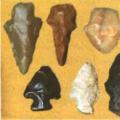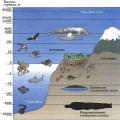Pick at is a phrasal verb. Phrasal verb Pick up
The word pick means “to select”, “to choose”. But what happens if we add small words (prepositions) to it? Let's see if this makes a difference!
Many people are very familiar with the word pick up in the sense of “meeting a guy or girl for a romantic relationship.” There is such a word in English, but, oddly enough, it is not often used in this meaning.
In this article we will find out what more may be what people mean when they tell you to “pick up”! Intrigued? Read on!
8 meanings of phrasal verbs with pick in English

Read about what phrasal verbs are and how to use them in this article.
Our hero today is the word pick and the 7 most common phrasal verbs that are formed from it.
1. Phrasal verb pick at
Transcription and translation:[pɪk æt] / [peak et] - pick, fiddle (about objects or food)
Meaning of the word: Pulling or touching something constantly; if it’s about food, eat for a long time and in small pieces, because you’re not hungry.
Use:
This word is used with objects or food. For example: John nervously fiddled with his napkin. I was picking at the last piece of cake because there was no one else to finish it.
Examples:
Don't pick at your scratch, put some band-aid on it!
Not pick cover your scratch with a piece of plaster!
You"re not even eating, you"re just picking at your dinner. Has something happened?
You don't even eat, you just pick at your dinner. Something happened?
Attention: Teach English language for a long time, but can't speak? Find out in Moscow how to speak after 1 month of classes using the ESL method.
2. Phrasal verb pick on
Transcription and translation:[pɪkɒn] / [peak he] - cling to someone, pester, tease
Meaning of the word: Criticize someone, call them names, “attack”
Use: pick + on + the one who is being pestered. For example: Fred clung To ( picked on) John at school until John started going to karate. Small dogs sometimes start pester (pick on) to big ones.
Examples:
Some drunk guy in the bar started picking on me because he didn't like my shirt.
Some drunk guy at the bar started run over at me because he didn't like my shirt.
Stop picking on those who are weaker than you!
Enough pester to those who are weaker than you!
3. Phrasal verb pick out
Transcription and translation:[pɪk aʊt] / [pick out] - select, take away
Meaning of the word: Carefully select an object or person from a group of similar
Use: pick + out + what (or who) was chosen. For example: Jury took away (picked out) my work out of hundreds of others submitted to the competition. I took away (picked out) the ripest apples for the holiday table.
Examples:
We need to pick out suitable wallpaper for the living room.
We need choose suitable wallpaper for the living room.
I was tasked with picking out the best resumes of all that were sent to us.
I was given a task take away the best summaries of them all that were sent to us.
4. Phrasal verb pick up #1
Transcription and translation:[pɪkʌp] / [pick up] - pick up, pick up
Meaning of the word: Pick up someone or something and hold it in your hands
Use: pick + up + what was picked up. For example: Groom took on hands (picked up) bride. I picked up (picked up) money from the floor.
Examples:
The child was constantly asking the father to pick him up.
The child constantly asked his father take his on hands.
He picked up his suitcase and left.
He raised his suitcase and left.
5. Phrasal verb pick up #2
Transcription and translation:[pɪkʌp] / [pick up] - meet by car, pick up, give a ride, give up
Meaning of the word: Meet someone in a car somewhere or take them somewhere
Use:
If this word is used with the indication, Where everything happens, we are talking about the fact that they meet someone in a car, that is, they wait at a specified place in order to then take them. For example: I need meet (pick up) friend at the airport. I can take(pick up) you at 7 at your house.
If already specified, Where a person will be taken, then pick up is translated as “to give a lift.” For example: Every morning he picks up the children to school. If you don't have money for travel, then I can help you give a ride (pick up).
Examples:
I could pick you up home if you want.
I could have you give a ride home if you want.
He picked up a hitchhiker on his way home.
He gave me a lift hitchhiker on the way home.
6. Phrasal verb pick up #3
Transcription and translation:[pɪkʌp] / [pick up] - pick up the phone, answer the phone
Meaning of the word: Answer the phone call
Use:
This word can be used with the word "telephone". For example: I called him all day, but he never picked up ( pick up the phone). Jack took the phone ( picked up the phone), but they were silent on the phone.
However, in everyday speech the word "telephone" can be omitted. For example: I called him all day, but he never answered ( pick up). When an unknown number calls, I don't answer ( pick up).
Examples:
Pick up the phone, please, this ringing is getting on my nerves.
Reply on the phone please, this ringing gets on my nerves.
I"ve been trying to call him for an hour but he doesn"t pick up.
I've been trying to call him for an hour now, but he doesn't beret.
7. Phrasal verb pick up #4
Transcription and translation:[pɪkʌp] / [peak up] - intensify, increase
Meaning of the word: Become stronger, increase in number
Use:
This word can be used when something increases in quantity or improves itself. For example: Prices are constantly increasing (pick up). The wind is picking up again. Our sales have increased (picked up) by 15% this year.
Or it can be used if someone increases or gains something in quantity. For example: The train has started dial (pick up) speed. John needs dial (pick up) weight if he wants to become a boxer.
Examples:
We picked up the pace when we realized we didn't have much time.
We accelerated(literally: increased the pace) when they realized that there was not much time left.
The rain is picking up, we need to wait it out!
Rain intensifies, we need to wait it out.
8. Phrasal verb pick up #5
Transcription and translation:[pɪkʌp] / [pick up] - gain, pick up (about information or skills)
Meaning of the word: Gain knowledge, skills, habits and other information by chance rather than through systematic study
Use: pick + up + received information. For example: I'll show you a trick that I picked up (picked up) from colleagues. He picked up (picked up) some Spanish words while living in Mexico.
Examples:
Where did you pick up this bad habit?
Where are you picked up this bad habit?
"I didn"t know you knew judo!" - "Oh, it"s nothing, I picked up a few things here and there...""
"I didn't know you knew judo!" - "Yes, so, got enough something here and there..."
Reinforcement task
Fill in the correct word in the blank. Leave your answers in the comments below the article.
1. Judging by the way the guests ___ the cake, it was not very successful.
2. Sorry, I couldn’t ___ an hour ago, I had a meeting.
3. If you receive a call from this number, do not ___.
4. Before the speech, he was nervous and ___ the edge of the paper with the text of the speech.
5. The police dispersed the hooligans who ___ towards a random passerby.
6. Try to ___ only the most necessary information.
7. He ___ found the wallet to look for information about the owner.
8. I ___ you at the station.
9. I ___ a couple interesting facts from this book.
10. Ashley promised ___ me before work.
11. Excuse me, could you ___ my pen? She rolled under your table.
12. The economic situation in the country ___ after the new reform.
13. This sport ___ popularity several years ago.
14. Teacher ___ the most interesting quotes from students’ work.
15. While working in Korea, he ___ some common phrases.
16. Previously, Ted’s classmates ___ at him because of his glasses, but now they respect him and ask him to write off his credit.
The phrasal verb pick up is special, multifaceted, you will say that many phrasal verbs have more than one meaning, but pick up is completely unusual. To see the variety of meanings, consider the use of the phrasal verb pick up.
1.Expresses the idea of a film, a movie, a spectacle that becomes more and more interesting.
The action movie was quite slow at the beginning, but it really picked up in the middle. At first the dynamics of the film are very slow, but by the middle there is a noticeable acceleration.
The song is very slow at first, but the tempo picks up a lot after the first verse. This song, which starts out very slow, speeds up a lot after the second verse.
2. Stabilization of business and economic projects.
Business really picked up after the summer because people were no longer on summer vacation. With many people returning from their summer holidays, business has picked up.
Sales were down for the first three months of this year, but they’re starting to pick up now. After a three-month decline in sales, they are currently growing.
3. The rapid disappearance of someone or something.
"Where's Ralph?" "Where's Ralph?"
"I don't know." He was here, but then he just picked up and left. I don’t know where he went.” I don't know. He was just here, then he got up and went somewhere walked.
4. An offer to pay a bill (for someone else).
Don’t worry about getting any extra money for tonight. I'm going to pick up the tab. Don't worry, you won't need any additional expenses, I'll pay the bill.
The check will be picked up by the boss tonight. The check will be cleared by the supervisor this evening.
5. Learn something from detailed examples.
When I was traveling through France, I picked up a little French. I learned to speak a little French while traveling in France.
I don’t know how to use this machine, but I’m sure I can pick it up quickly. I don't know how to use this machine, but I'm sure I can figure it out quickly.
6.Meet someone, rent someone for the night.
A strange guy tried to pick me up in the bar last night. I told him I wasn’t interested. One guy I didn’t know tried to pick me up in a bar, but I said I wasn’t interested.
7. When the police arrest someone.
The guy who stole my money was finally picked up by the police. The police finally caught the thief who robbed me.
8. About something that gives you strength (music, drinks, food, communication).
If I'm tired, I have a cup of coffee. It really picks me up. If I'm tired, I drink a cup of coffee, it cheers me up.
9. Catch a signal.
My radio is really good. It can pick up signals from over 300 kilometers away. My receiver is simply super, it picks up more than 300 stations.
10. Pick up something from the floor, from the road.
I saw a fifty dollar bill on the ground this morning, so I picked it up and put it in my pocket. This morning I saw a fifty dollar bill on the ground, picked it up and put it in my pocket.
Imagine that you are buying new jeans in a store. You decided to pamper yourself and choose something more expensive. So you choose this thing very carefully.
You found out that a new collection of denim clothing has recently been released. When something goes on sale or is published, it come out.
- Spring collection - 2013 has come out.
You come to the store, wander around for a long time looking for the right model and finally take it - pick up- the pair you like.
- Let's pick up this pair of jeans.
You go to the fitting room and take off your clothes - take off to try on jeans. Every time you take something off yourself, you are take off.
- You need to take your trousers off before trying the jeans on.
If you put something on yourself, and in our case it’s jeans, then you wear this thing put on.
- Put the jeans on, so I can see whether they fit.
You liked the jeans, so you go to the checkout - come over- to pay.
- Let's come over the cashier and pay for the jeans.
These phrasal meanings are the most popular in colloquial speech. However, others are often used.
Pick up - pick up from the floor.
Pick the toys up or I"ll punish you. - Pick up the toys, otherwise I will punish you.
Take off - take off, for example about an airplane.
After a 2-hour delay the plane finally took off. - After a two-hour delay, the plane finally took off.
Come over - stop by, stop by, drop by.
Come over my place some time and we"ll discuss this matter. - Drop by my place some time and we’ll discuss this matter.
Examples for pinning from Twitter
This interesting exercise, which will allow you to consolidate phrasal verbs.
Each tweet contains the verbs we went over above.
Study 5-10 short messages to reinforce them.
pan out
Translate:(no object): succeed; happen as expected (for plans). (almost always negative when in statements.)
Translation: succeed; succeed (as planned)
I"ll be here next week after all. My trip to Chicago didn"t pan out.
pass away
Translate:(no object): die
Translation: die
I was very sorry to hear that your grandfather passed away.
pass out
Translate:(no object): faint; lose consciousness
Translation: lose consciousness
When Ella heard that she won a million dollars, she was so shocked that she passed out.
Translate:(separable): distribute
Translation: give out, distribute (free)
Everyone in the room needs one of these information sheets. Who will help me pass them out?
pick out
Translate:(separable): choose; select
Translation: distinguish, differentiate
Billy"s grandmother especially liked her birthday card because Billy had picked it out himself.
pick up
Translate:(separable): lift; take up
Translation: lift up
Those books don"t belong on the floor. Will you help me pick them up?
Translate:(separable): arrange to meet someone and give her/him a ride
Translation: to drop by, drop in (for someone)
Of course we can go there together. What time should I pick you up?
Translate:(separable): get; buy
Translation: buy
The children just drank the last of the milk. Could you pick some more up on your way home this evening?
Translate:(separable): refresh; revitalize
Translation: recover; recuperate
He was feeling a little tired, so he drank a glass of orange juice. It picked him up enough to finish his work.
pick on
Translate:(inseparable): bully; intentionally try to make someone upset
Translation: pester (someone); tease (someone)
You should be ashamed of tempting your little brother, Bob! Pick on someone your own size!
pitch in
Translate:(no object): help; join together to accomplish something
Translation: contribute
We"ll be finished soon if everyone pitches in.
pull over
Translate:(no object): drive a vehicle to the side of the rode
Translation: pull over and stop
When the policeman indicated that I should pull over, I knew he was going to give me a ticket.
put away
Translate:
Translation: put in place
I just took these clothes out of the dryer. Will you help me put them away?
put off
Translate:(separable): postpone; delay; avoid
Translation: turn off; postpone (sth. to a later date)
When will Mr. Smith agree to a meeting? I keep asking for an appointment, but he keeps putting me off.
put on
Translate:(separable): begin to wear; don
Translation: put on
It"s a little bit chilly outside. You"d better put a sweater on.
Translate:(separable): try to make someone believe something that is ridiculous or untrue
Translation: pretend, pretend
Don"t believe a word of what Jim was saying. He was just putting us on.
put up
Translate:(separable): return something to the proper place
Translation: put in place
Your toys are all over the floor, Timmy. Please put them up.
Translate:(separable): provide someone with a place to sleep
Translation: to host for the night, to give shelter (to guests)
There"s no need for you to check into a hotel. I"ll be happy to put you up.
put up with
Translate:(inseparable): tolerate
Translation: tolerate
It"s really important to come to work on time. The boss won"t put up with tardiness.
put back
Translate:(separable): return something to the proper place
Translation: move backwards (clock hands); return (to the harbor, to the shore); put in place
I"ve finished with these books. Do you want me to put them back on the shelves?
put (someone) out
Translate:(separable): inconvenience of someone
Translation: drive out; remove, eliminate;
I hate to put you out, but I need a ride to the train station and hope you can take me.
 What is matter in physics and chemistry?
What is matter in physics and chemistry? Poems “I go out alone on the road” M
Poems “I go out alone on the road” M How does the biosphere differ from other layers of the earth?
How does the biosphere differ from other layers of the earth?